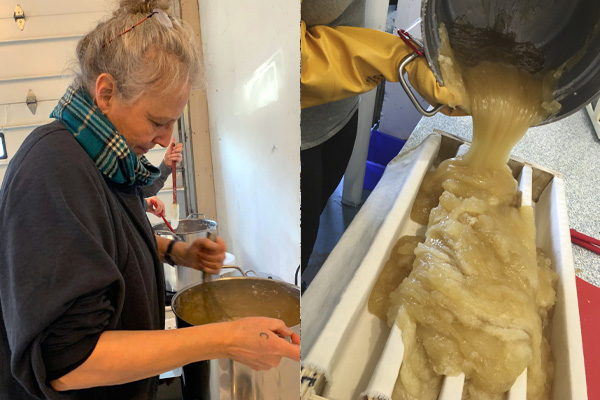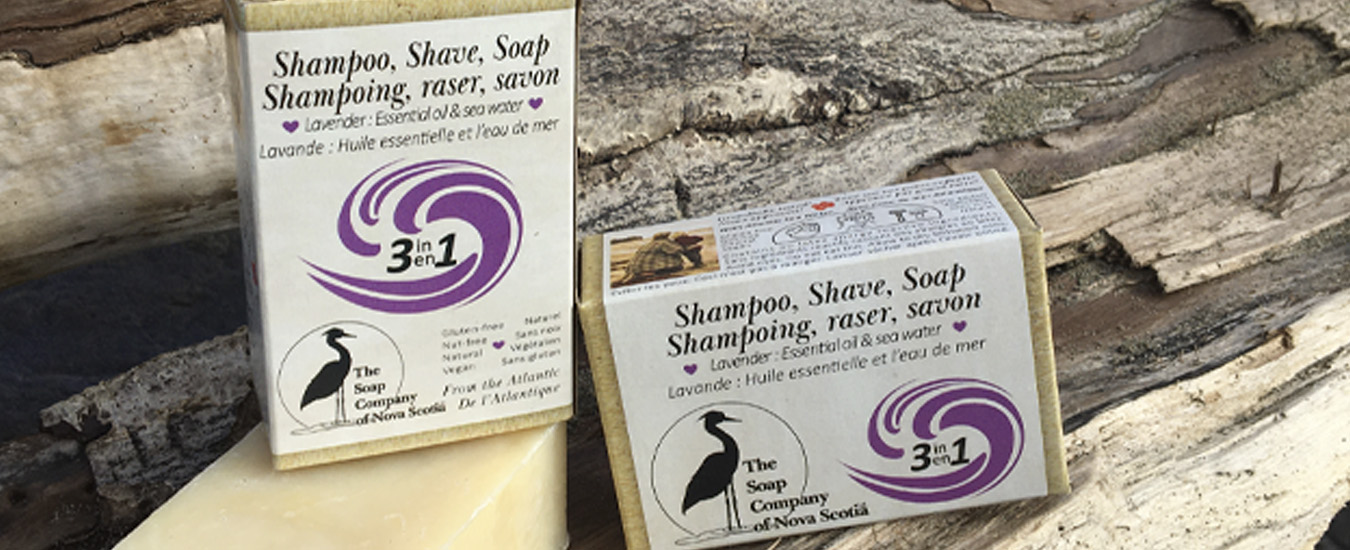After a disastrous fire, The Soap Company of Nova Scotia is rising up, bar by bar
The past few years had been a clean sweep for Leigh McFarlane and her Soap Company of Nova Scotia. Leigh had taken early retirement from government work in PEI to come home to Nova Scotia in 2013, and from her home on the Eastern Shore, had determined what would come next for her.
“I settled on making soap because it’s not perishable, and it’s something we need every day,” she says. “I could start small and scale up if it was well received, and I also wanted to help reverse outmigration and poverty in Guysborough County.” With assistance and wisdom from her friend Jennifer Ridgeway of Moonsnail Soaps in PEI, she learned much about the art of making soap, sourcing ingredients, and opened her store in July of 2014 with a dozen different types of hand soap—lemon scrub, a plain one, lavender soap, and more.” Her unscented laundry soap also made its way onto the shop shelves on opening day.
Today, the Soap Company of Nova Scotia has refined and grown its product line, to include 16 different soap bars—including a pet shampoo, baby soaps, seasonal holidays soaps, a stain remover and a host of classic, essential-oil scented varieties—as well as a spa line with bath and foot care products, candles and essential oils; a skin care line of deodorants, moisturizers, hand fixers, baby care; and a laundry powder in five natural scents.
Although this is an impressive inventory, Leigh says the company’s focus has narrowed some since its beginnings. “Every time someone mentioned an idea, I would take it on, but it became clear to me what was and wasn’t going to work, and I had to be content when we made products, too!” In 2019, she decided to go gluten free, dropping the beer shampoo line which had gluten in it, and using sea water instead. In early 2020 the company removed avocado oil from their products, when Leigh learned that avocado can be an issue for people with latex allergies. “My youngest grandchild has peanut allergies, so we removed the almond oil to eliminate potential nut reactions,” she adds. “If we make products strictly for those with food and chemical allergies and it works for them, it’ll work for everyone!”
Initially, Leigh was planning to make all unscented products, but once she realized what she didn’t like were synthetic scents, and she learned how to work with natural essential oils, she determined to offer some essential oil scented products as well as the unscented line. The production plant was divided into two sections so that one side is completely unscented from production to fulfillment and storage. She takes pride in saying that through grants and working with StFX, they developed a 100 per cent natural emulsifier and the same in preservatives. “The only synthetic ingredient in our whole lineup is a synthetic lye, which is the safest way to make mild, safe soap. Natural lye is too inconsistent, and we certainly didn’t want that.”

Leigh hand-making a batch of soap. “The only synthetic ingredient is...a lye, the safest way to make mild, safe soap,” she says.
Bit by bit, show by show, bar by bar, Leigh’s company reach expanded, and her lines can be found in numerous independent merchants throughout Atlantic Canada and beyond. She’s also in Sobeys and affiliated stores, some Atlantic Superstores in the region, and has a dedicated Prime shop on Amazon.com for US customers. “There’s something for everyone,” she says, “by providing different scents for people. We make one type of candle but offer it in different scents. We’ve cut our products by about 60 per cent since 2018, and still have plenty.”
The arrival of COVID-19 did throw a crimp into the company’s production and sales, but the available wage subsidy helped so that Leigh could bring in her staff. “I could focus on how to market in this different world,” she says. “We can’t do demos now but we provide samples to new stores so they can give them out.”
Leigh found herself as busy as ever with the website and with heavy marketing of wholesale products. Through working with Advocate, a printing and publishing company based in Pictou, NS, she had new artwork for displays and packaging. She says, “we grew this past year because we proved we have something repeatable and predictable, and we just keep doing what we do.”
Then on the evening of November 22 last year, a small puff of smoke escaping from the lint trap in Leigh’s washer led to the discovery of fire in the washing machine. It escalated quickly, since that was a windy, stormy night, right on the ocean, with propane tanks behind the property. Even though the fire departments arrived as quickly as possible and fought valiantly, “there was little they could do between the wind and the propane having to burn off and everything just…burned.”
Despite the huge setback, Leigh says, “Our business didn’t burn—our operation did. We had our knowledge, our recipes and so on all stored in the cloud, but we lost every physical thing in the building.” This was especially hard as Leigh was living in the house and lost many precious items that had been in her family through eight generations. “But the land is still there and all those generations before give me strength.”
As of this issue, Leigh and her team are making soap in the old Sherbrooke Fire Hall, and says, “so many people came out to help, it’s like they wrapped us up in a great big hug.” She received many donations of food and clothing as well as financial help and is staying at her mother’s house while they plan on a more permanent location for production. “The Friday following the fire, we launched the Rise Up collection of a dozen-plus items we expect to ship out early in the new year—the most cost-effective and least process-heavy items to get us up and going.”
Leigh says support for the collection has been tremendous and it’s helped restore her natural optimism. “We believe positive energy is a part of our business and products,” she explains. “As we make soap, we do it by hand, everyone on the team has positive thoughts, and that energy from us goes into the soap, which is made, cut and boxed by hand...people buy and use it on themselves. And that’s the most beautiful way of connecting the whole process together.”
